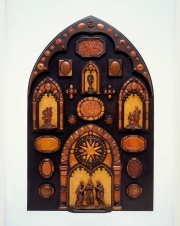Difference between revisions of "Congo copal"
Jump to navigation
Jump to search
(username removed) |
|||
| (2 intermediate revisions by 2 users not shown) | |||
| Line 1: | Line 1: | ||
| + | [[File:02.222-E11509CR-d1.jpg|thumb|Devotion panel<br>MFA# 02.222]] | ||
== Description == | == Description == | ||
| − | A medium hard variety of [ | + | A medium hard variety of [[copal]] resin obtained from trees ''Copaifera demeusi'' in western Africa. Congo copal is insoluble in most organic solvents until it has been thermally treated. It forms transparent gels with some alcohols, hot oils and and hot solvents. Congo copal is used in varnishes and paints for metal surfaces. |
== Synonyms and Related Terms == | == Synonyms and Related Terms == | ||
| Line 7: | Line 8: | ||
copal del Congo (Esp.); Congo resin; Congo gum | copal del Congo (Esp.); Congo resin; Congo gum | ||
| − | == | + | == Risks == |
| − | + | * Combustible, burning with a bright flame, dense smoke and strong smell. | |
| − | Saponification number = 132.4. Acid number = 122.5 Most copals fluoresce white under short-wave UV light. | + | ==Physical and Chemical Properties== |
| + | |||
| + | * Soluble in diacetone alcohol. Slightly soluble in acetone, ethanol, benzene, turpentine. | ||
| + | * Saponification number = 132.4. | ||
| + | * Acid number = 122.5 | ||
| + | * Most copals fluoresce white under short-wave UV light. | ||
{| class="wikitable" | {| class="wikitable" | ||
|- | |- | ||
! scope="row"| Melting Point | ! scope="row"| Melting Point | ||
| − | | 180-200 | + | | 180-200 C |
|- | |- | ||
! scope="row"| Refractive Index | ! scope="row"| Refractive Index | ||
| Line 22: | Line 28: | ||
|} | |} | ||
| − | == | + | ==Resources and Citations== |
| − | |||
| − | |||
| − | |||
| − | |||
| − | |||
| − | |||
| − | + | * K.van den Berg, J.van der Horst, J.Boon, "Recognition of Copals in Aged Resin/oil Paints and Varnishes" in ICOM Preprints, Lyon, 1999. p.855-861. | |
* Richard S. Lewis, ''Hawley's Condensed Chemical Dictionary'', Van Nostrand Reinhold, New York, 10th ed., 1993 | * Richard S. Lewis, ''Hawley's Condensed Chemical Dictionary'', Van Nostrand Reinhold, New York, 10th ed., 1993 | ||
| Line 40: | Line 40: | ||
* Thomas B. Brill, ''Light Its Interaction with Art and Antiquities'', Plenum Press, New York City, 1980 Comment: ref. index = 1.545 | * Thomas B. Brill, ''Light Its Interaction with Art and Antiquities'', Plenum Press, New York City, 1980 Comment: ref. index = 1.545 | ||
| − | * | + | * H.G.Richter, M.J.Dallwitz, ''Commercial timbers'' at http://ciologie.uni-hamburg.de/b-online/wood/english/caegu-bu.htm - lists as Copaifera demeusei |
[[Category:Materials database]] | [[Category:Materials database]] | ||
Latest revision as of 11:21, 4 July 2022
Description
A medium hard variety of Copal resin obtained from trees Copaifera demeusi in western Africa. Congo copal is insoluble in most organic solvents until it has been thermally treated. It forms transparent gels with some alcohols, hot oils and and hot solvents. Congo copal is used in varnishes and paints for metal surfaces.
Synonyms and Related Terms
copal del Congo (Esp.); Congo resin; Congo gum
Risks
- Combustible, burning with a bright flame, dense smoke and strong smell.
Physical and Chemical Properties
- Soluble in diacetone alcohol. Slightly soluble in acetone, ethanol, benzene, turpentine.
- Saponification number = 132.4.
- Acid number = 122.5
- Most copals fluoresce white under short-wave UV light.
| Melting Point | 180-200 C |
|---|---|
| Refractive Index | 1.545 |
Resources and Citations
- K.van den Berg, J.van der Horst, J.Boon, "Recognition of Copals in Aged Resin/oil Paints and Varnishes" in ICOM Preprints, Lyon, 1999. p.855-861.
- Richard S. Lewis, Hawley's Condensed Chemical Dictionary, Van Nostrand Reinhold, New York, 10th ed., 1993
- R. J. Gettens, G.L. Stout, Painting Materials, A Short Encyclopaedia, Dover Publications, New York, 1966 Comment: Copaifera demeusi; melting point = 180-200C
- G.S.Brady, Materials Handbook, McGraw-Hill Book Co., New York, 1971 Comment: p. 227; Copaifera demeusi
- Thomas B. Brill, Light Its Interaction with Art and Antiquities, Plenum Press, New York City, 1980 Comment: ref. index = 1.545
- H.G.Richter, M.J.Dallwitz, Commercial timbers at http://ciologie.uni-hamburg.de/b-online/wood/english/caegu-bu.htm - lists as Copaifera demeusei
